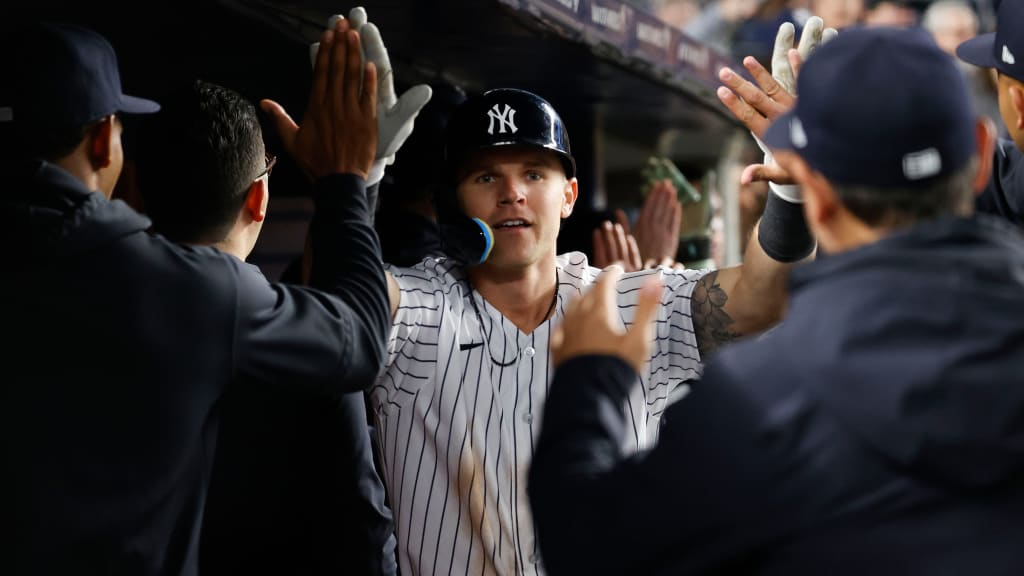
If you didn’t predict the emergence of Jake Bauers this season, don’t feel bad -- you’re far from alone. As the 27-year-old slugger freely admits, everything that has happened in 2023 has been something of a surprise, even to him. Or if you prefer, you can take it from Yankees manager Aaron Boone:
“I didn’t necessarily see this coming,” the skipper says. “I mean, he’s been really good. He’s kind of been a revelation for us. And I think a very interesting player moving forward.”
When the Yankees’ outfield corps needed reinforcement, Bauers was one of a number of callups who made the most of his opportunity. And when first baseman Anthony Rizzo was placed on the injured list in early August, the Southern California native was ready to step in at his original position. Several years removed from being a top prospect in the Rays’ system, Bauers -- who was immediately shipped to Triple-A in a little-noticed 2022 deal that saw the Yankees send cash to the Reds --has managed to stave off some of the mechanical and mental issues that slowed his rise. As he explained to Yankees Magazine deputy editor Jon Schwartz in a conversation for the New York Yankees Official Podcast, it’s all about taking on every challenge that gets you to the present moment.
Yankees Magazine: This might be a rude or weird way to start this off, but I’m going to admit that when we read your name on the transaction wire last year, I wasn’t necessarily rushing to prep a long interview with Jake Bauers.
Jake Bauers: Yeah, I don’t think you were the only one. I don’t think I was expecting any of this, either. But when you get out of your own way and let the universe take over, I think good things tend to happen.
YM: We joke around a lot here about how hard it is for players to come in and get a jersey number that doesn’t look like they’re on a back field somewhere in Spring Training. I’ve got to say, man, 61’s a pretty good number; that’s got some juice in the Yankees’ history. How do you feel when you put that number on your back?
JB: To be honest with you, I’m not even thinking about it too much. I mean, 61 wouldn’t have been my first choice. But I feel like it’s not the worst option available. I’m more concerned about the pinstripes and the NY on the chest.
YM: That’s fair. Are you a history guy? Have you been out to Monument Park yet?
JB: No, I haven’t. I need to go.
YM: Fix that! They’ll give you a nice tour, I promise. I know it’s very hard to play in the Major Leagues. These guys that you’re facing are the best. At the same time, though, being a lefty in Yankee Stadium, there must be times when you walk into that batter’s box, look out there and think, “Oh, this place is meant for my swing,” right?
JB: Yeah, you can definitely feel that way at times. But I think when you step in the box in a big league game, the only thing you’re worried about is that guy on the mound because, like you said, these dudes are good, man. They’re the best in the world. They’re getting paid for a reason. And so really, all of that mental focus and mental energy goes into preparing and being ready for whoever’s out there.
YM: You’ve been open about the fact that one thing you’ve had to work on in your life and in your career is the mental challenge. It’s unfair, but nonetheless easy, for fans to sometimes ignore the humanity in all of this. And hopefully, it’s changing in some ways. But I especially wonder, sometimes, for a guy like Aaron Judge, a guy like Giancarlo Stanton, they’re viewed as superheroes as opposed to human beings who have things going on in their lives. Do you feel like, as someone who has had to scratch and claw to make a career, that you’ve found a way to manage some of that?
JB: For sure. The fans are what drive the game, the fans buy the tickets, the fans pay the subscriptions, the fans buy the jerseys. They have a right to be upset when their team isn’t winning or when their team isn’t playing well or when they disagree with something that’s happening. But at the same time, you just have to be able to separate it. You have to understand that I almost have two pieces of me: I have Jake Bauers, the baseball player who goes out at 7 o’clock and plays, and then I have the guy who goes home at 11:30. And I have to be able to separate those two.
YM: But I want to push back there a little bit because I think part of the problem might be that the baseball player side of you isn’t just the guy who goes out there at 7. It’s the guy who got here at 2. And he was working all day to get ready for 7. I mean, isn’t that a part of it, too?
JB: Yeah, no doubt. I guess when I say the guy who goes out and plays at 7, I mean the guy who is at work.
YM: It’s visible. I get it.
JB: But yeah, you’ve got your work life and your home life. And I think being able to separate those two is crucial to at least having some kind of mental stability throughout the year.
YM: The work that goes in -- it’s not just weight work. It’s not just cage work. There’s so much studying; it’s essentially an AP class. Success is so, so earned. So, whether it goes into the second deck here or bounces off the very bottom of the foul pole, what’s that feeling like of getting to trot around the bases after a homer?
JB: If they could bottle it up and sell it, I’d be addicted. It’s a surreal feeling. You’ve got the lights flashing, the fans are going crazy. You just helped your team. It’s an amazing feeling. And hopefully, I get to do it a lot more.
YM: A lot of us remember a couple of years back when Brett Gardner threw his helmet and split his lip. Your unintentional tribute to him a few weeks ago certainly did evoke some memories. Is it about time that we instituted a no-helmet-throwing policy around here? Do we need to formalize this?
JB: I think it’s all part of it. Like, we were talking about pressure and everything that comes along with being a Yankee, and part of that is frustration, right? And sometimes you’ve got to let it out. Hopefully, your helmet doesn’t bounce off the ground and hit you in the face, but it’s OK. Trust me, I’ve been catching a lot of jokes around the clubhouse for it.
YM: I heard you described it as “a heat-seeker.”
JB: I mean, I never had a chance. But I will say, I feel like I ate it pretty well.

YM: This franchise through the years, though, there’s kind of a spectrum there. You have Nestor Cortes, cool and goofy. You have Gardy trying to break the dugout roof, you have Paul O’Neill going to war against some water coolers. Where would you say you fit, generally? I mean, you are a California guy.
JB: Man, I think it really depends. I think you’ve got to be yourself. Sometimes that can be intense. Sometimes that can be goofy. It really just depends on how the game is going, how I’m feeling, what’s happening. But I definitely have the ability to throw a helmet, obviously. I don’t think I’m going to do that as many times as I’m not going to do that. But I think the biggest thing is you have to be yourself.
YM: Tampa Bay, Cleveland, Seattle, New York. That’s just your big league time at this point. You also had, I guess, Cincinnati, and you were drafted by San Diego. You’re 27 years old, and you’ve got some baseball in front of you, one thinks, and a pretty good Immaculate Grid already. As you move around, though, whether Minors or Majors, how do you carry those experiences? How do they shape who you are now?
JB: I think everything that happens in your life is there to teach you something, whether it be good or bad, in between, anything. Every experience that you can have, you’re having it for a reason. And the more you’re able to be objective about things and the more you’re able to be present, I think the more of those things you pick up and are able to carry them forward. And so, I think all those places that I’ve been have almost in a sense been preparing me to be here. And so now that I’m here, it’s, “How can I use my time in Seattle to help me while I’m here in New York? How can I use my time in Tampa to help me here in New York?” And when you look at everything like that, it makes it a lot easier day to day because you’re not getting wrapped up in something that you might perceive as negative. You’re looking at it from a perspective of, “OK, this is happening, this might stink now. But what can I get from this? How can I use this tomorrow to be better?”
YM: But do you get a chip on your shoulder? The dream when you’re drafted, I assume, is that you’re going to retire with the San Diego Padres, get your number hung on a wall and enter the Hall of Fame with an SD on your hat like Tony Gwynn. As you keep moving, do you ever feel like, “This has to be it. This has to be the stop where it all clicks.”
JB: I might have used to think like that. Like, of course, you want to be drafted by San Diego and spend the next 20 years there, right? I know, it’s super cliché, but everything happens for a reason. And so, whatever has happened to me in the past 10 years of my baseball career has happened because that’s what I needed to happen. I think when you are looking at things like that, it’s just freeing in a way that allows you to not be so wrapped up in the stress, the pressure that you might put on yourself, and it just allows you to go be yourself and experience all this. It’s a crazy life. There’s so much going on, and to enjoy it all, and to be able to look back and say, “Damn, I had a good time,” you have to be present. You can’t be wrapped up in your own head, because I’ve been there, and it’s not good. It’s not useful. It feels terrible. And that’s just not something that I’m interested in.
YM: Let’s go back a bit. First walk-off homer, June 24, 2018. Playing for the Rays. I’m guessing you remember the opponent …
JB: Uh, yeah. New York Yankees.
YM: Take me through that moment. I can’t think of much that could feel better than a walk-off homer.
JB: Yeah, that was crazy. I think I went a little nuts there, too, running around the bases. I know it was bottom 12, before the ghost runner. Chasen Shreve on the mound. I was just trying to smack a single the other way, trying to get something going. And I remember hitting the ball, and I was like, “Oh, I might have gotten that.” And I started running. I’m like, “I don’t know if I got it …” I hit first base; it goes over the wall. And I threw my helmet up in the air running in between first and second, which I don’t think you’re supposed to do. But anything goes, I guess, when you’re a 22-year-old kid hitting your first walk-off homer.

YM: You’re 5-11, right?
JB: We’ll call it 6 foot.
YM: Let’s call it 6 foot. But you can pass for a normal-sized person on the street. Do you ever wonder how Aaron, Giancarlo, Clay Holmes -- guys that are so tall -- can manage? You talk about leaving your baseball life here. They don’t get to blend into the crowd, per se …
JB: I remember asking Judge one time, I was like, “Hey, man, do you ever get tired of being Aaron Judge?” I don’t know, it’s tough for sure when you can’t separate it. But I think those guys have such a good understanding of what it is that they do that it’s almost a nonfactor for them. I think they have whatever they have outside of here. And they’re happy with it. And they’re able to come and be who they are and leave and be who they are. I think they just have it down so well.
Jon Schwartz is the deputy editor for Yankees Magazine. This story appears in the September 2023 edition. Get more articles like this delivered to your doorstep by purchasing a subscription to Yankees Magazine at www.yankees.com/publications.